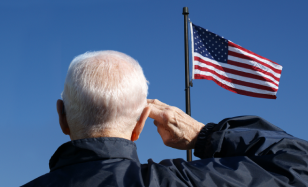The Link Between Camp Lejeune Water & Cancer
Military service members, their families, and other civilians who lived or worked at Camp Lejeune in North Carolina from 1953 to 1987 were exposed to toxic chemicals called volatile organic compounds (VOCs) through the water there.
Some VOCs are known carcinogens, meaning they cause cancer. Over time, exposure to these toxins can result in the growth of malignant (cancer) cells in different parts of the body.
A recent study by the Agency for Toxic Substances and Disease Registry (ATSDR) found elevated cancer rates in those who lived or worked at Camp Lejeune when the water was polluted.
The Camp Lejeune Justice Act (CLJA) allows anyone harmed by the water on base to file a claim for compensation. Families can also seek justice and compensation if a loved one developed a Camp Lejeune cancer or another health condition from the contaminated drinking water but has since passed away.
The deadline to file a Camp Lejeune cancer claim is August 10, 2024.
Get started right now with a free case review.
The Camp Lejeune Cancer List
The U.S. Department of Veterans Affairs (VA) has recognized eight presumptive illnesses — 6 of which are different types of cancer — connected to the contaminated water. This means that the VA acknowledges a link between these conditions and the victim’s military service.
However, Camp Lejeune cancer victims can file a claim for compensation regardless of the type of cancer they have.
So far, more than a dozen cancers have been linked to the toxic chemicals in the water at Camp Lejeune.
The Camp Lejeune cancer list includes:
- Adult leukemia (VA presumptive condition)
- Bladder cancer (VA presumptive condition)
- Brain cancer
- Breast cancer
- Cervical cancer
- Childhood cancer
- Colorectal cancer
- Esophageal cancer
- Kidney cancer (VA presumptive condition)
- Liver cancer (VA presumptive condition)
- Lung cancer
- Multiple myeloma (VA presumptive condition)
- Non-Hodgkin’s lymphoma (VA presumptive condition)
- Pancreatic cancer
- Prostate cancer
- Sarcoma
A cancer diagnosis can turn your life upside down and result in costly medical bills, emotional distress, and more.
If you or a loved one developed a Camp Lejeune cancer from the contaminated water on base, you may be owed compensation.
Our Camp Lejeune case managers are standing by to help those affected — call (888) 726-9160 or chat right now for free.

Our case managers can answer your questions and connect you to an attorney.
Chat NowCauses of Camp Lejeune Cancer
ATSDR found VOCs in the drinking water supplied by two of Camp Lejeune’s eight water treatment plants — the Tarawa Terrace and Hadnot Point facilities.
“These contaminants likely increased the risk of cancers (kidney, multiple myeloma, leukemias, and others), adverse birth outcomes, and other adverse health effects of residents.”
— Agency for Toxic Substances and Disease Registry
The agency attributed the contamination to the disposal of solvents by an off-base dry cleaning business, leaking underground storage tanks, and other sources.
The U.S. Environmental Protection Agency (EPA) has listed Camp Lejeune as a superfund site, meaning that it is considered contaminated land.
ATSDR found these and other cancer-causing chemicals in Camp Lejeune’s water:
- Benzene
- Tetrachloroethylene — also known as perchloroethylene (PCE)
- Trichloroethylene (TCE)
- Vinyl chloride
- Other contaminants
ATSDR has linked these contaminants to different types of Camp Lejeune cancer, as well as other health conditions.
| Contaminant | Potential Health Effect |
|---|---|
| Benzene | Leukemia Non-Hodgkin’s lymphoma |
| PCE | Bladder cancer |
| TCE | Kidney cancer Non-Hodgkin’s lymphoma Cardiac defects |
| Vinyl Chloride | Liver cancer |
Source: Agency for Toxic Substances and Disease Registry
Additionally, ATSDR states that the health effects related to these chemicals depend on several factors.
These include:
- Amount of the exposure
- Duration of the exposure
- How you were exposed (for example, by drinking or bathing)
- When you were exposed (for example, while in utero or as a child)
Regardless of the details related to your exposure, we’re here to help Camp Lejeune cancer victims get the justice and compensation they deserve.
Contact our team right now to learn about your legal options.
Can I File a Lawsuit for Cancer From Camp Lejeune?
Yes, you may be able to file a Camp Lejeune water contamination lawsuit if your cancer is related to the contaminated water on the military base.
Additionally, you may be able to file a wrongful death lawsuit on behalf of a loved one who passed away from a Camp Lejeune cancer, even if their death occurred decades ago.
To qualify for a Camp Lejeune cancer lawsuit, you or your loved one must have:
- Spent at least 30 days on the military base between 1953 to 1987
- Was later diagnosed with any type of cancer from exposure to the water
Steps to File a Camp Lejeune Lawsuit for Cancer
Camp Lejeune lawsuits allow victims to seek compensation and justice for personal injuries related to Camp Lejeune toxic water.
The basic process is detailed below:
- Find a Camp Lejeune law firm: These firms have attorneys on staff who focus on Camp Lejeune cases. Get a free case review to see if you can work with a top Camp Lejeune law firm in our network.
- File your Camp Lejeune cancer claim: Your lawyer will file your claim, along with supporting evidence and documentation.
- Negotiate a Camp Lejeune settlement: They will work to negotiate an out-of-court settlement with the federal government. The goal is to get you the most money possible as quickly as they can. If a settlement can’t be reached, your attorney will argue your case in court.
The deadline to file a Camp Lejeune cancer claim is August 10, 2024.
A Camp Lejeune lawyer can ensure that your claim is filed correctly and before this fast-approaching deadline.
Settlements for Camp Lejeune Cancer Claims
According to legal experts, settlements for Camp Lejeune cancer claims could be worth $1 million or more in some cases.
The U.S. Department of the Navy (DON) and Department of Justice (DOJ) have offered expedited payouts to those with certain Camp Lejeune cancer types through Elective Option (EO) payouts.
Under this tiered system, victims qualify for compensation ranging from $100,000 to $550,000, depending on the type of health condition involved, the amount of time spent on base, and whether the victim has passed away from their illness.
Victims with these Camp Lejeune cancers may qualify for EO payouts:
- Bladder cancer
- Kidney cancer
- Leukemia
- Liver cancer
- Multiple myeloma
- Non-Hodgkin’s lymphoma
- Systemic sclerosis (scleroderma)
As of January 16, 2024, 8 people with Camp Lejeune cancer have accepted EO payments totaling just under $2 million.
Those who qualify for EO payouts may get compensation in a few months, while the settlement timeline for other victims may be longer.
See if you can work with a top Camp Lejeune lawyer to pursue a Camp Lejeune cancer settlement.
Get Legal Help for Camp Lejeune Water Contamination Cancer
The Camp Lejeune Justice Act allows those with any type of cancer related to the water on the military base to file a claim and pursue justice and compensation for the suffering they’ve endured.
Family members can also take action on behalf of a loved one who has since passed away.
The Camp Lejeune attorneys in our network are leaders in this new area of litigation and are well-positioned to help eligible families get the compensation they deserve.
Our legal partners:
- Can assist victims in all 50 states
- Don’t charge any upfront fees
- Have already helped over 30,000 families with their Camp Lejeune claims
Take the first step toward justice — get a free case review right now.
FAQs About Camp Lejeune Cancers
What type of cancer did Camp Lejeune have among its military and civilian residents?
The toxic water at Camp Lejeune put military families and civilian workers at an increased risk of more than a dozen different types of cancer.
Camp Lejeune cancer types include:
- Bladder cancer
- Brain cancer
- Breast cancer (in men and women)
- Cervical cancer
- Colorectal cancer
- Esophageal cancer
- Kidney cancer
- Liver cancer
- Lung cancer
- Multiple myeloma
- Non-Hodgkin’s lymphoma
- Pancreatic cancer
- Prostate cancer
- Rectal cancer
- Sarcoma
What are 10 diseases caused by contaminated water at Camp Lejeune?
The water at Camp Lejeune was contaminated with dangerous chemicals that have been connected to dozens of serious health conditions, including many types of cancer.
Ten diseases that may be caused by the toxic water on base are:
- Amyotrophic lateral sclerosis (ALS or Lou Gehrig’s disease)
- Aplastic anemia
- Birth defects
- Bladder cancer
- Crohn’s disease
- Heart disease
- Liver cancer
- Myelodysplastic syndromes
- Parkinson’s disease
- Scleroderma
What are the symptoms of contaminated water at Camp Lejeune?
Depending on the illness involved, symptoms related to the toxic water on the military base may vary from person to person.
According to the American Cancer Society, common signs of cancer include:
- Eating problems, like loss of appetite, nausea, or vomiting
- Extreme fatigue
- Pain that doesn’t go away or worsens
- Swelling or lumps on the body
- Unexplained weight loss or gain (10 pounds or more)
If you’re experiencing any of these symptoms, it’s a good idea to see your health care provider and tell them about the time you spent at Camp Lejeune during the public health crisis.
What is a Camp Lejeune Tier 1 cancer?
The Camp Lejeune cancer list includes 5 cancers that are considered Tier 1 health conditions. This means that individuals with these cancers may qualify for expedited claim payouts through the government’s Elective Option (EO) system.
The Tier 1 Camp Lejeune cancer list is:
- Bladder cancer
- Kidney cancer
- Leukemia
- Liver cancer
- Non-Hodgkin’s lymphoma
However, Camp Lejeune victims with any type of cancer connected to the toxic water can file a claim for compensation.
Do all Camp Lejeune types of cancer qualify for a claim?
Yes, all types of cancer qualify for a Camp Lejeune claim, as long as the victim spent at least 30 days on base between August 1, 1953, and December 31, 1987, and has a health condition related to the water contamination.
The Camp Lejeune Justice Act (part of the PACT Act), passed by Congress in August 2022, makes it possible for Camp Lejeune victims and their families to file claims against the government for compensation.
A Camp Lejeune lawyer can review the facts of your case and file a claim on your behalf if you meet the criteria.
Call our team at (888) 726-9160 or fill out our online form to take the first step toward the justice and compensation you deserve.
 Get Legal Help Now
Get Legal Help Now
